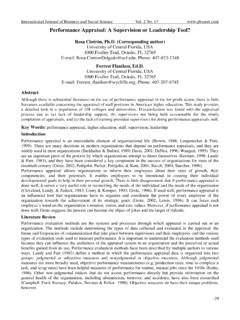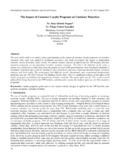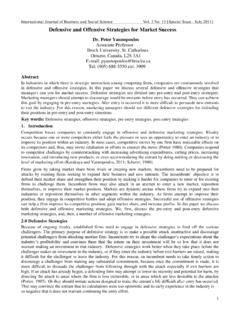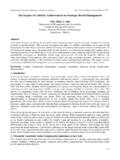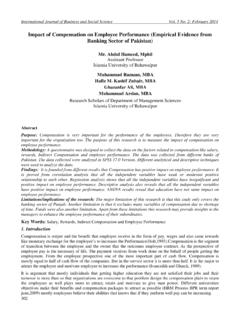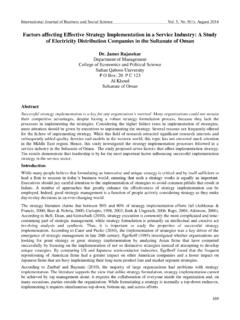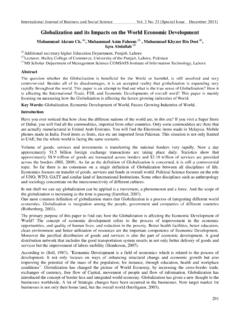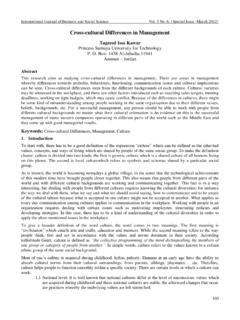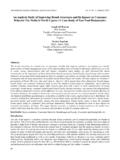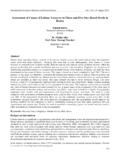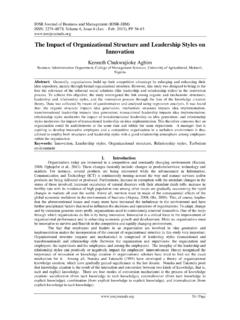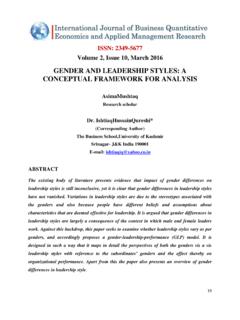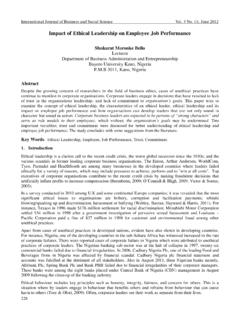Transcription of Impact of Transactional and Laissez Faire Leadership Style ...
1 International Journal of Business and Social Science Vol. 3 No. 7; April 2012 258 Impact of Transactional and Laissez Faire Leadership Style on Motivation Abdul Qayyum Chaudhry Assistant Professor Institute of Education & Research University of the Punjab Quaid e Azam Campus Lahore, Pakistan. Husnain Javed Scholar (2009-11) Hailey College of Commerce University of the Punjab Lahore-Pakistan. Abstract The research is based Transactional , Laissez Faire Leadership Style and their Impact on Motivation conducting in banking sector of Pakistan to identify that which Leadership Style is good for the employee to increase their Motivation level with the organization. For conducting this research a research question was to be used and got the result through Descriptive study and Co relational study (SPSS).
2 Population size was 278 and at the end of the research we found that Transformational Leadership has positive, strong and significant association with the Commitment. But the motivational level in respect of Laissez Faire is low because of not interference of management. Laissez Faire also have positive relation but due to insignificance relation it indicate that Laissez Faire Style is not an important Style that boost the motivation level of workers as compare to other Leadership styles. 1. Introduction Leadership is the ability to increase a group toward the get the vision or set of goals. It is one of the managerial Qualities of the company or the organization which interaction with the workers of the organization and has a large Impact on the turnover rate of the organization. Leadership is the very big toll or the weapon of the organization to accomplish its goals and its necessary objectives and without it, it is impracticable for the organization to attain its main target.
3 Without the Leadership the implementation of tasks and their achievements are impossible. (Quinn Mills, 2005). Our study is based on what is the result of Transformational and Laissez Faire Leadership on Motivation and examine the correct Leadership and methods used by organization in Pakistan to find out which method of Leadership is favorable in the global Business. Problem Statement To identify the dominate Leadership Style in public and private sector banking organization as perceived by the employees and to determined its relationship with Motivation level of employees. The study will help in identifying how Transactional and Laissez Faire Leadership Style is more signified relationship with the employee attitude with motivation. Objectives of the study Our Objective of study is to transcend the result of Transactional and Laissez Faire Leadership with the motivation.
4 Hypothetical study has been used for understanding the Relationships and to observe the effects and extents of Leadership styles practices over motivation. So, the main objective is that to find out that which Leadership Style is beneficial for the organization and than we will suggest the better Leadership Style in the banking sector of Pakistan and Manager should work on it and observe also that Style . Significance of the Study Leadership is the main weapon of the organization through better Leadership managers can achieve their organizational goals and can increase their productivity also of the organization. Positive Leadership influences a big Impact on the workers and the turnover the organization. Centre for Promoting Ideas, USA 259 Motivation will lead the productivity of the organization.
5 The study will help in recommending a Leadership framework for the banking sector that how this Leadership Style will be more effective in committed employee for the organization. 2. Literature Review Transactional Leadership Robbins defined the Transactional Leadership as Leaders who lead primarily by using social exchanges for transactions (Robbins, 2007, ). Contingent Reward These rewards are connected to the performance of the employee. If employee puts efforts it is recognized by the rewards. The rewards which an employee gain on the accomplishment of a target is contingent reward. The leader communicates to followers (workers) that what have too done to receive the rewards they judge Management by Exception (active) It takes the notice of any deviations from the rules and regulations, and if there is it takes the action for correction.
6 Whenever there is deviation from the rules and regulations management but expectation happens and the actions for corrections are also taken. The leader fallow followers to work on the mission and doesn t interfere unless goals aren t being achieved in a proper time and at the reasonable cost. Transactional Leadership means the leaders or the bosses who leads primarily by using social behavior exchanges for maximum benefit at low cost. Because leaders motivates their employees to perform their duty to show their responsibilities, to know their goals, to know their needs so reward of their work can be achieved. In Transactional Leadership Style if you are working very well than you will be rewarded due to good work and if you are not showing your commitment with your organization you will be punish. Leaders also helps the subordinate that how to perform work for the organization and how to accomplish the organizational goals.
7 Laissez Fair Style Robbins (2007) explained the Laissez -fair Style as Abdicates responsibilities avoid making decisions (p. 475).Similar Luthans (2005), defined Laissez - fair Style as Abdicates responsibilities avoids making decisions ( ). Laissez - Fair is uninvolved in the work of the unit. It s difficult to defend this Leadership Style unless the leader s subordinates are expert and well-motivated specialists, such as Scientists. Leaders let group members make all decision (Mondy&Premeaux, 1995, ). Behavioral Style of leaders who generally five the group complete freedom, Provide necessary materials, participate only to answer questions, and avoided giving feedback (Bartol&Martin, 1994, ).The concept of Laissez was also given by Osborn as Abdicates responsibilities and avoiding decisions (Osborn, 2008, ).
8 Above All the Authors defines the Laissez Fair Leadership with their own words according to their given definitions the idea of this type of Leadership is same. Authors defines that in this Style the Leaders normally don t want their interference in decision making process. They normally allowed to their subordinates that they have power to get their personal decisions about the work. They are free to do work in their own way and they are also responsible for their decision. Normally Leaders avoids to making decision and don t involve in working units because the leaders gives to subordinates to completely freedom to do decisions. Sometimes the leaders provide them to important material and they just involve the answer &question but avoiding feedback. Motivation The process of that account for an individual s intensity, direction, and persistence of effort toward attaining a goal (Robbins et al.)
9 , 2007, ). Desires want wishes aims goals needs drives motives and incentives (Luthans, 2005, ). The forces that energizes behavior, gives direction to behavior, and underlies the tendency to persist (Bartol&Martin, 1994, ). Motivation is desires to put forth efforts in pursuit of organizational goals mangers can always improve their understanding of the forces that energize employees. There is enormous energy within every person and manger certainly should not prevent its release (Mondy & Premeaux, 1995, ). The set of forces that initiates, directs, and make people persists in their efforts to accomplish a goal (Williams, 2009, ). Refers to forces within an individual that account for the level, direction, and persistence of effort expended at work ( Osborn, 2008, ). International Journal of Business and Social Science Vol.
10 3 No. 7; April 2012 260 The psychological forces that determine the direction of a person s behavior in an organization, a person s level of effort, and a person s level of persistence ( George & Jones, 2008, ). The set of processes that arouse direct, and maintain human behavior toward attaining some goals (Greenberg & Baron, 2009, ). Technically word motivation traced Latin word mover which means to move . Motivation is a subroutine which begins with a physiological or psychological defect or wants that start a manner of acting that is plan to accomplish a goal or objective. Born whenever there are some physiological or psychological implance called Need. Physiological and psychological drives are movement directed and accessibility of power push toward reaching an incentive. Inducement or Incentive means the things which will alleviate a wants and which decrease a drive.
